- nordsueddialog.org
- /
- ARCHIVE
- /
- EVENTS
- /
- 2014
17th of November 2014 - Human Rigths and Business Abroad
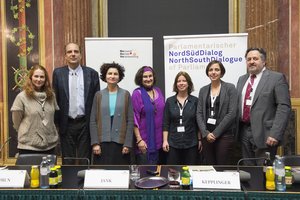
If “northern” companies are doing business in the "global south" questions regarding their responsibility in terms of human rights violations arise – not only since the terrible events of "Rana Plaza" in Bangladesh. Within the European Union provisions of labor law and consumer protection law are quite comprehensively protecting human rights. At international level, the UN Human Rights Council voted in June 2014 for the establishment of a working group to develop a binding international instrument on business and human rights. The resolution (“Ecuador initiative”) found worldwide support, but was rejected by Austria.
At the event in the Austrian Parliament the study "Human Rights and Business Abroad - Measures recommended to safeguard Human Rights effectively on activities of Austrian enterprises abroad" released by the NGO “Network Social Responsibility” (NeSoVe) was presented. It includes individual measures on how to induce positive changes in terms of the universal implementation of human rights on legal level. The Austrian government is not only responsible for the enforcement of human rights in Austria, but in all countries in which Austrian companies operate.
With this study, the political decision makers should be stimulated to enforce a change of policy. Voluntary CSR activities proofed not to be an adequate response to the urgent issues related to human rights violations. The regulatory gaps in Austrian law, as well as measures to enable a more effective binding legal protection of foreign activities of Austrian companies, are set forth in detail in the presented study.
>>> Photogallery
26th of May 2014 - Global partnership for development; an Austrian contribution to the post-2015-debate
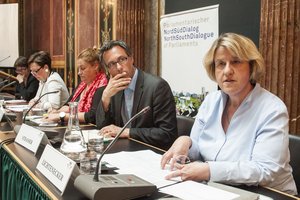
In 2015 the reference period for the achievement of the Millennium Development Goals (MDGs Millennium Development Goals) ends. Under the heading "post- 2015" the international community and the United Nations are currently discussing how to proceed with a global development agenda. In addition to the already present report of the High Level Panel of Eminent Persons an open UN Working Group is currently employed with the formulation of sustainable development objectives (Sustainable Development Goals - SDGs). In parallel, an international committee of experts working out proposals for sustainable development financing. The reports of all three groups of experts form the basis for final negotiations in autumn 2014. The new framework will be adopted in September 2015 at a UN summit.
Austria is also called upon to participate actively in the discussion about the "post- 2015" agenda. The event invited a wide circle of stakeholders to take the opportunity to interact and share their perspectives. In two plenary sessions and four working groups different topics were discussed - private sector and responsibility for people and the environment, demography and gender issues, global education and public relations and the role of parliaments - rule of law and good governenance. The results of the working groups were presented by MPs in a final plenary session. An initial assessment and the main findings are presented in early July in the print newsletter of the NorthSouthDialogue of Parliaments, a detailed summary of the event with all the results will be published in September.
>>> Records of the working groups (in German only)
>>> NordSüdDialogFORUM (Bulletin, Summary)
>>> Motion for a resolution in the Austrian Parliament (November 2014)
27th of March 2014 - FAIRTRADE Event at the Austrian Parliament
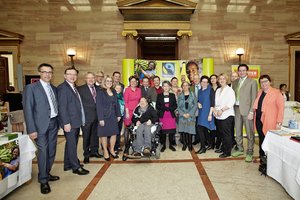
Even before the plenary session, the deputies were able to participate at a fair breakfast. The President of the National Council, Barbara Prammer, together with the AWEPA Section Austria and FAIRTRADE Austria invited to an information meeting in the Collonnaded Hall of the Austrian Parliament. The event wanted to underline the importance of developing cooperation and fair trade.
This time, the focus of the exhibition were fairly produced textiles. Portrayed were initiatives and opportunities redarding the socially and ecologically fair production of textiles. Both the politicians as well as the population need more awareness in this regard. Wage slavery and textile production, especially in cotton production, are closely related, stressed Edeltraud Novy FAIRTRADE Austria.
Since more than 20 years, products with the FAIRTRADE label offer the certainty that the producers of agricultural goods such as coffee, cocoa or cotton, can sustainably improve their living conditions in the countries of the South. Small farmers get fair prices, wage-related workers on plantations, flower farms or tea gardens get better working conditions, and thereby trust and security for their own future.
18th of March 2014 - Round Table on "Political Foundations in Development Cooperation"
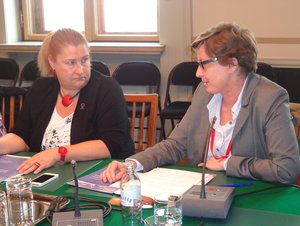
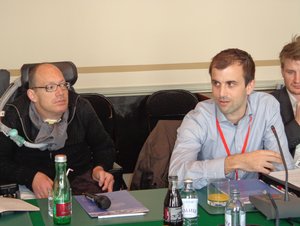
Johannes Steiner, Executive Director of the Vienna Institute for the Environment - Peace - Development (IUFE) welcomed the attendees and introduced the "European Network of political foundations - independent actors in the promotion of democracy, development cooperation and political dialogue" ( ENoP ) briefly. The ENoP was founded in 2006 and acts as a communication and dialogue institution between European political foundations and institutions of the European Union and civil society stakeholders in the fields of democracy promotion and development cooperation. It currently has 67 members from 20 EU member states.
MP and chairwoman of the AWEPA section in the Austrian Parliament, Petra Bayr, introduced briefly the work of AWEPA International and Austria in her opening remarks. She was delighted at the opportunity to get to know the work of ENoP and to discuss possible connections.
Sidonie Wetzig, head of the ENoP Working Group on Development Assistance, presented the beforementioned position paper in her keynote address. Basically, the position paper is a further step in the direction that political stakeholders should play an enhanced role in the development debate. In the current or the post-2015 context, development cooperation has to deal with different challenges than in the past decades. Through globalization the world was made economically and socially more interdependent and diversified. The role of citizens has also changed by the possibilities of communication and in many states there is a desire for more far-reaching participation.
On the other hand, the structures of the public administration and governance can not cope with the changed circumstances (yet). Supranational and global institutions are often powerless with their working methods in the face of problems of economic crises, increasing environmental destruction, poverty alleviation and the growing social inequality. In addition, there are more players such as the BRICS countries, which make the old division of the world obsolete and create new relations of power.
Read full report as PDF (German).

